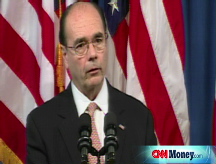Fannie, Freddie aftershocks: More bank woes
Government seizure of Fannie and Freddie could cause problems, even failure, for many small banks, even if it helps to stabilize the battered mortgage market.
NEW YORK (CNNMoney.com) -- The takeover of Fannie Mae and Freddie Mac is likely to cause big problems for hundreds of community banks nationwide and could lead to a new round of bank failures.
That's because many smaller banks had a large amount of funds tied up in the preferred shares of Fannie and Freddie, depending on the dividends for reliable income, and the value of those shares to meet the capital levels required by regulators.
Now the dividends have been scrapped and the share values are in question.
"For many banks it was a safe and steady income stream," said Brian Gardner, senior vice president and chief political analyst for Keefe, Bruyette & Woods, an investment bank that specializes in financial firms. "It's cutting off an important source of income for the banks at time when income is not easy to come by."
The government took over the operations of Fannie and Freddie on Sunday and is keeping both the common and preferred shares in place, leaving it to the market to determine their value. But without the dividends, the already battered value of the shares could fall further, leaving banks that hold them without required capital levels.
Even before Sunday's action, the FDIC's watch list of problem banks and thrifts had jumped 30% from the end of March to the end of June, leaving 117 at-risk institutions. A year earlier, the list had just 61. This past Friday, the 11th bank of the year failed.
There is still hope that the preferred shares will perform well. "Investors might be relieved that all they did was lose their dividend," said William Isaac, a former chairman of Federal Deposit Insurance Corp. "A lot of people were worried the preferred would be wiped out."
But there's a lot about Sunday's action that could further hit shares, which have already lost half their value in recent months.
Treasury Secretary Henry Paulson on Sunday indicated that one reason the government had to take control of Fannie and Freddie was "based on what we have learned about these institutions over the past four weeks - including what we learned about their capital requirements." That suggests the upcoming losses are worse than previously believed.
Paulson also said "there is a consensus today that these enterprises pose a systemic risk and they cannot continue in their current form."
Gardner said that means at the least there will be a lot of uncertainty about the future of the two firms, which generally is bad for share prices.
"We've all known about problems for quite some time, but until there was a crisis there was no need to resolve it," said Gardner. "Well, crisis don't get much bigger than this."
It was impossible to Sunday to know how many banks are now at risk as a result of the government action.
Government officials acknowledged that risk on Sunday, while they sought to downplay the immediate threat to banks.
"While many institutions hold common or preferred shares of [Fannie Mae and Freddie Mac], a limited number of smaller institutions have holdings that are significant compared to their capital," said a statement Sunday by leading bank regulators.
Those regulators said that they "are prepared to work with these institutions to develop capital-restoration plans pursuant to the capital regulations." But those steps by regulators can often mean the takeover of a troubled bank by a healthier institution.
Analysts who looked the limited information available on holdings of Fannie and Freddie's preferred shares ahead of Sunday's bailout said the preferred shares made up a significant share of holdings at more than a handful of banks.
An August research note from KBW identified 38 regional banks, mostly smaller ones, that between them hold about $1.3 billion in the preferred shares of Fannie and Freddie. At least eight banks had more than 10% of their capital tied up in the shares, while another six had between 5% and 9%.
And that is likely only the tip of the iceberg of those holdings, said Sam Caldwell, the KBW analyst who was the author of the report.
"We were only able to identify $1.3 billion in these holdings. It's entirely possible it's multiples of that number beyond that held by other banks," he said last month.
A few banks have already started to write down the value of those shares. Wilmington Trust (WL), a regional bank based in Delaware, took a $12 million charge related to holdings of Fannie and Freddie preferred shares in the second quarter. That contributed to the bank's $20 million loss in the period.
Caldwell said he doubts the hits regional banks will have to take from the decline in Fannie and Freddie's preferred shares would cause widespread failures, although some could face severe capital problems.
Virginia Beach-based Gateway Financial Holdings (GBTS), has about 34% of its tangible capital tied up in Fannie and Freddie preferred shares, according to Caldwell. Just behind is Midwest Banc Holdings (MBHI), a suburban-Chicago bank with 32% of its capital tied up those shares.
Neither of those banks, nor Wilmington Trust, responded to requests for comment on the KBW note last month.
Caldwell's research found the regional bank with the largest investment in the preferred shares is Sovereign Bancorp (SOV, Fortune 500), a Philadelphia-based thrift which KBW estimates has Fannie and Freddie preferred shares originally worth $588 million, or about 13% of its tangible capital.
Kirk Walters, Sovereign's chief financial officer, said that even with his bank's relatively large exposure to Fannie and Freddie shares, Sovereign is not facing a capital shortfall of its own. "Even in a worst-case scenario, we remain well capitalized and have a more than adequate cushion under all regulatory standards," he said in a statement.
It's not just regional banks that will take a notable hit if Fannie and Freddie preferred shares are wiped out. In August JPMorgan Chase (JPM, Fortune 500), the nation's No. 2 bank in terms of assets, disclosed that it owned about $1.2 billion in preferred shares of Fannie and Freddie. But even if that investment ends up being a total loss for the bank, it probably will not have a major impact on the bank, as it represents just less than 1% of its tangible capital.
Regional banks, while small in comparison the nation's major banking institutions, are generally too big to be at risk of being taken over by the FDIC. But the problem may be even worse for the many small community banks, most of which are not even publicly traded and have therefore not had to report financial results publicly. ![]()




